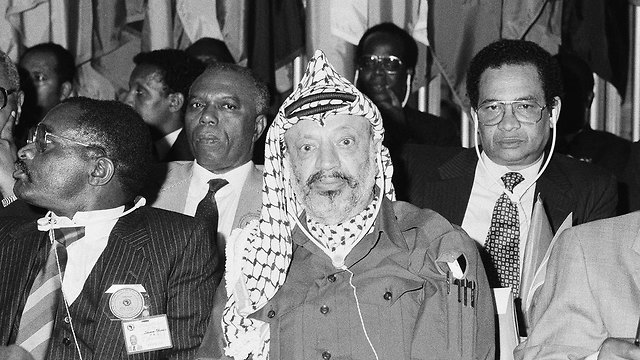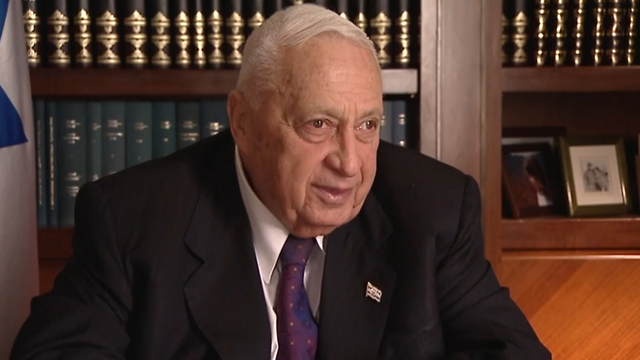Op-ed: Rafael Eitan and Ariel Sharon’s eagerness to kill the Palestinian leader at all costs was countered by junior and senior officers who stood up to them and prevented operations that had the potential of putting innocent lives at risk; David Ivry, Uzi Dayan, Aviem Sella, Amos Gilboa and others are the heroes of this affair.
The continuous attempts to kill Yasser Arafat are an affair that deserve a book of its own and stems from a double Israeli perception: First of all, that Israel must do everything, absolutely everything, to avoid long wars; to delay the next war and go to war “only when the sword is upon the neck,” as late Mossad Director Meir Dagan said. Instead of wars, there is a need for focused, covert operations deep within enemy territory.
Second, because the course of history can be changed by assassinating leaders. Meir Dagan told me so explicitly: “I thought that liquidating him would have changed the course of history. Arafat was not only a Palestinian leader, but a kind of founding father of the Palestinian nation. Killing him would unleash a large part of the internal conflicts inside the PLO and significantly hinder its capability to make any strategic decisions from then on.”

But beyond killing Arafat, there was the issue of hurting innocent people around him. And that is, in my opinion, the most important point in this entire story. When Yehoshua Sagi, head of the Military Intelligence Directorate, heard in early 1982 that Israel was going to kill Arafat and all his assistants in a huge explosion, which might affect innocent people, he went to Deputy Defense Minister Mordechai Tzipori, Ariel Sharon’s rival, and convinced him to go to Prime Minister Menachem Begin, his former boss from the Irgun underground organization, and persuade him to call off the operation.
During the war, Lieutenant-Colonel Uzi Dayan took command of the Salt Fish task force, which went to besieged Beirut to trace Arafat and provide the Air Force with his locations for the purpose of a bombing. Uzi Dayan was just as hesitant: “Arafat was saved by two things—His interminable good luck and me. I thought Arafat was a legitimate target but not one which justifies every mean. If I saw it involved the killing of many civilians, even if we knew Arafat was there, I didn’t agree to let them go ahead with the bombing. Raful (Rafael Eitan, the chief of staff) used to blow up with anger. He’d call me up and say: ‘I understand you have information on such and such a place. Why aren’t the planes in the air?!’ I replied that it was impossible because there were a lot of people around. Raful said: ‘Forget about it. I’ll take responsibility for it.’ I wasn’t prepared to allow it. Raful would not teach me the ethics of war.
“At a later stage, the chief of staff reminded me that I didn’t have the authority to decide whether or not to drop a bomb. All I had to do was to report when the target was ripe from an intelligence point of view. So from that point on, each time we knew that bombing would lead to massive civilian casualties, we reported that the target wasn’t ripe from an intelligence angle.”

After the war, when Sharon, who was so eager to kill Arafat “the dog,” instructed the Air Force to shoot down planes carrying the Palestinian leader, a group of IAF officers decided it simply wouldn’t happen.
“I went to see Eitan,” says Aviem Sella. “I told him: ‘Chief of staff, we do not intend to carry this out. It simply will not happen. I understand that the minister of defense is dominant here. No one dares to stand up to him, and therefore we will make it technically impossible.’ Raful looked at me and never said anything. I took his silence as consent.”
Each time a plane carrying Arafat was detected, Sella initiated a series of actions that made the operation impossible. At the same time, Sharon got into trouble with the commission of inquiry appointed to investigate the Christian massacre of Palestinians in the Sabra neighborhood and Shatila refugee camp in Lebanon, and he got distracted from the operation, “which faded away until it was completely called off.”
The bottom line is that this is a story of ethics of combat and maintaining battle morals. Raful and Sharon’s (and Begin’s too, according to Sharon’s military secretary, Oded Shamir) strong desire—and that’s an understatement—to kill Arafat at all costs was countered by junior and senior officers who stood up and—either through words or through action—prevented operations that had the potential of putting innocent lives at risk. David Ivry, Uzi Dayan, Aviem Sella, Amos Gilboa and others are the heroes of this affair.
As reported by Ynetnews
